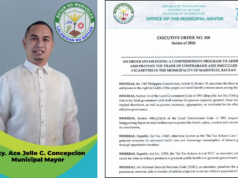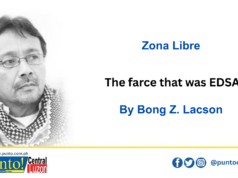ALIAGA, Nueva Ecija – A rendezvous of wishes and pledges from agricultural stakeholders, to include presidential sisters, for the 26-village town here after hybrid farming proved to be a viable answer to the nation’s woes for rice self-sufficiency.
At a makeshift hall beside the golden ricefield planted to hybrid variety, National Food Administrator Angelito Banayo, along with Presidential sisters Balsy Aquino-Cruz and Pinky Aquino-Abellada, shared dreams of a prosperous future for agricultural workers being inspired by farmers led by Rolando Acain who harvested 221 cavans per hectare based on a crop cut survey.
“Talagang ang galing-galing, andami-dami niyang inani at talagang ako’y na-inspire na mag-kuwento sa aming kapatid na si P-Noy. Kailangang makita rin niya yung nagyari dito kung gaano kadaming inani dahil sa hybrid,” Cruz said.
Acain said he used to harvest 80 to 90 cavans per hectare from inbred varieties.
He said the government’s support is essential for hybrid planters since it requires extraordinary care. “Sa binhi man lang at fertilizer ay matulungan ang magsasaka.”
The sisters, along with National Food Administrator Angelito Banayo, joined local officials headed by Mayor Marcial Vargas and businessman Henry Lim in a harvest festival steered by hybrid rice producer SL-Agritech as inspired by President Aquino’s public-private partnership (PPP) system of governance.
Cruz also said she would discuss to Aquino the problems that farmers now face. She said they also helped agricultural workers in La Trinidad Benguet where the President sent government assistance there last week.
“Dapat ang mga magsasaka, kagaya ng mga karaniwang empleyado na may SSS at GSIS (Social Security System and Government Service Insurance System) kapag sila’y nag-retiro ay mayroon din naman silang matatanggap,” she added.
Acain appealed to the Aquino government to revive the hybrid rice subsidy program. “If possible it should be extended to fertilizer too”.
The department of Agriculture (DA) used to subsidize P2,000 per bag of hybrid rice which is priced at P4,500 to entice farmers into planting the high yielding varieties. The incumbent government, however, dissolved the subsidy.
Banayo said that if the Aliaga experience will be replicated in at least 400,000 hectares of ricefield, the nation can easily achieve its rice self-sufficiency target.
He also said that NFA is set to import 200,000 metric tons of rice as against the previous administration’s importation of 4-million metric tons. To date, he said there are 1.4 million metric tons which is equivalent to 28 million bags of rice in NFA warehouses.
Banayo vowed to discuss to a cabinet meeting the concerns of local farmers, particularly subsidy.
He added that the NFA Central Luzon office reported a decrease in rice production of Nueva Ecija this season because farmers shifted from hybrid to inbred as a result of the abolition of government subsidy.
Lim on the other hand, said that to cope up with the decline of hybrid planters, his company has offered a “plant now pay later scheme.”
“But because we are a private entity with bank loans, we give it to a limited scope. We really need the help of our government to pursue rice self-sufficiency program,” Lim said.
Provincial agriculturist Serafin Santos said the agency has extended subsidy to farmers tilling some 37 hectares affected by the wet season calamities.
At a makeshift hall beside the golden ricefield planted to hybrid variety, National Food Administrator Angelito Banayo, along with Presidential sisters Balsy Aquino-Cruz and Pinky Aquino-Abellada, shared dreams of a prosperous future for agricultural workers being inspired by farmers led by Rolando Acain who harvested 221 cavans per hectare based on a crop cut survey.
“Talagang ang galing-galing, andami-dami niyang inani at talagang ako’y na-inspire na mag-kuwento sa aming kapatid na si P-Noy. Kailangang makita rin niya yung nagyari dito kung gaano kadaming inani dahil sa hybrid,” Cruz said.
Acain said he used to harvest 80 to 90 cavans per hectare from inbred varieties.
He said the government’s support is essential for hybrid planters since it requires extraordinary care. “Sa binhi man lang at fertilizer ay matulungan ang magsasaka.”
The sisters, along with National Food Administrator Angelito Banayo, joined local officials headed by Mayor Marcial Vargas and businessman Henry Lim in a harvest festival steered by hybrid rice producer SL-Agritech as inspired by President Aquino’s public-private partnership (PPP) system of governance.
Cruz also said she would discuss to Aquino the problems that farmers now face. She said they also helped agricultural workers in La Trinidad Benguet where the President sent government assistance there last week.
“Dapat ang mga magsasaka, kagaya ng mga karaniwang empleyado na may SSS at GSIS (Social Security System and Government Service Insurance System) kapag sila’y nag-retiro ay mayroon din naman silang matatanggap,” she added.
Acain appealed to the Aquino government to revive the hybrid rice subsidy program. “If possible it should be extended to fertilizer too”.
The department of Agriculture (DA) used to subsidize P2,000 per bag of hybrid rice which is priced at P4,500 to entice farmers into planting the high yielding varieties. The incumbent government, however, dissolved the subsidy.
Banayo said that if the Aliaga experience will be replicated in at least 400,000 hectares of ricefield, the nation can easily achieve its rice self-sufficiency target.
He also said that NFA is set to import 200,000 metric tons of rice as against the previous administration’s importation of 4-million metric tons. To date, he said there are 1.4 million metric tons which is equivalent to 28 million bags of rice in NFA warehouses.
Banayo vowed to discuss to a cabinet meeting the concerns of local farmers, particularly subsidy.
He added that the NFA Central Luzon office reported a decrease in rice production of Nueva Ecija this season because farmers shifted from hybrid to inbred as a result of the abolition of government subsidy.
Lim on the other hand, said that to cope up with the decline of hybrid planters, his company has offered a “plant now pay later scheme.”
“But because we are a private entity with bank loans, we give it to a limited scope. We really need the help of our government to pursue rice self-sufficiency program,” Lim said.
Provincial agriculturist Serafin Santos said the agency has extended subsidy to farmers tilling some 37 hectares affected by the wet season calamities.




